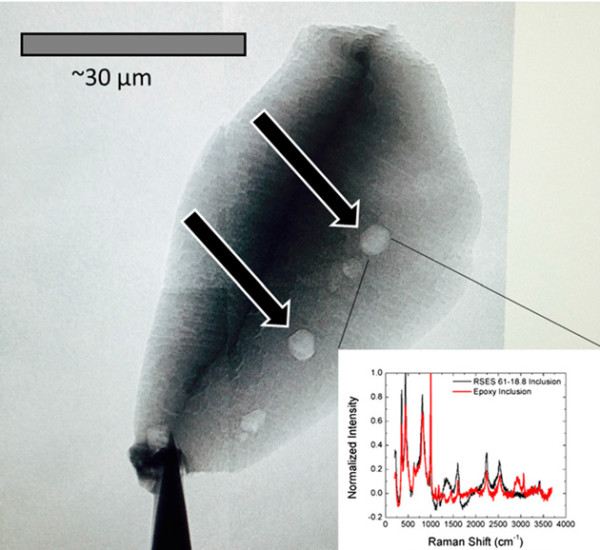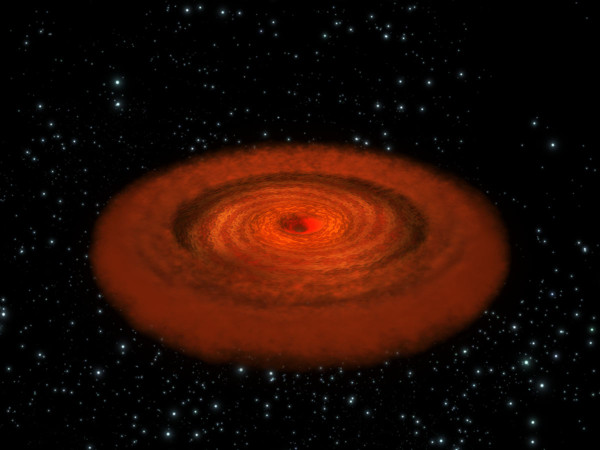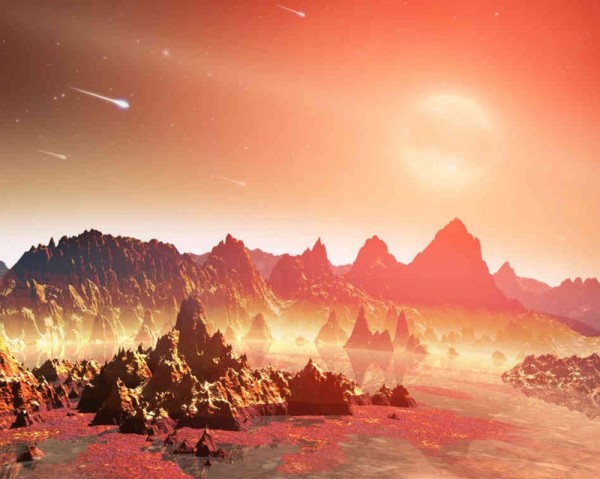"As I was going up the stair I met a man who wasn’t there. He wasn’t there again today. I wish, I wish he’d stay away." -Hughes Mearns
Although every week at Starts With A Bang is special, there's something extra special brewing here. Sure, we've got the "normal stuff" of the articles we've written:
- Do galaxies die? (for Ask Ethan),
- Spook-tacular science pumpkins (for our Weekend Diversion),
- Lifting the cosmic veil (for Mostly Mute Monday),
- Was Earth born with life on it?,
- and How stable is matter? (for Throwback Thursday).
Including two bonus ones over at Forbes:
- The Largest Cosmic Structures In The Universe Don't Actually Exist, and
- The Cosmic Origin Story Of Gold.
But before we jump into your comments, there are a few awesome announcements:
1.) Our first Patreon-sponsored podcast is complete! If you've ever been curious about water on Mars, life on Mars, or -- thanks to a great Q&A with our guest -- where I think the next fundamental breakthrough will come from, have a listen here:
2.) It's Halloween! While more pictures are coming, I have to give you all a preview. So you may remember a few years ago I very, very excitedly told you all about Axe Cop, which turned out to be one of the best surprise comics and TV shows I've ever found.
 Image credit: © Ethan Nicolle 2009-2015, of Ask Axe Cop #54, via http://axecop.com/comic/ask-axe-cop-54/.
Image credit: © Ethan Nicolle 2009-2015, of Ask Axe Cop #54, via http://axecop.com/comic/ask-axe-cop-54/.
Well, Axe Cop imagined himself with different hair and mustache styles, and the best one is Axe Cop with crazy pizza hair and a super-curly beard and mustache with a robot ghost that lives inside. (The best one, that is, according to Axe Cop, and that's the only one that matters.)
Well, folks...
That's your Halloween preview! More pictures coming (hopefully, and with much greater detail) tomorrow as part of our Weekend Diversion! And finally...
3.) Starts With A Bang is movin' on up in the world! I've been guest-contributing at Forbes for a few months now, and they love what I've been doing there. In fact, they love it so much that I'm excited to announce my main blogging activities will switch over to there beginning on Monday!
 Image credit: Forbes; screenshot from http://www.forbes.com/sites/ethansiegel/.
Image credit: Forbes; screenshot from http://www.forbes.com/sites/ethansiegel/.
Things will be a little different: we'll still do Mostly Mute Mondays (but we won't explicitly call it that); we'll still do Throwback Thursdays (but won't explicitly call it that); we'll still have weekly songs (but they'll be part of our Comments of the Week); and our Weekend Diversions will likely switch over to be more weekend wonder about the Universe.
But there's a saying that when you go to the dance, you dance with the one who brought you. That's part of the reason why I haven't left Scienceblogs (or you guys!) after landing here more than six years ago, and part of the reason why I'm going to stay on at Medium as well: it's the only platform that still gives readers a completely ad-free experience, and I want to be able to keep that! So I'll still be posting synopses here and running our weekly Comments of the Week, but now they'll be expanded to include even more awesome stuff.
And with all that said, it's onto the best of your Comments of the Week!
From Johan on what happens after the death of galaxies: "But what happens then?
"
Well, there are two ways to look at it. One is to look at what we physically think is going to happen and at the other (unfavored) possibilities:
- Favored: the Universe will continue to expand and cool until -- with the exception of quantum motion -- all thermal properties drop to absolute zero. Total energy is still conserved, and space and time continue for an eternity.
- Disfavored: dark energy will increase in strength, leading to either the Big Rip or a rejuvenated (high-energy) Universe.
- Disfavored: the expansion will reverse itself, leading to a Big Crunch or potentially a cyclic model.
- Disfavored: the quantum vacuum will tunnel into a more stable state, leading to an ultra-weak version of a new Big Bang, potentially producing some sort of matter and/or radiation.
Or, the second way it to ask about a more personal perspective: what ultimately happens to us when the Universe comes to this ultimate end? Lucky for you, if that was what you meant, that's the subject of our latest Ask Ethan! Enjoy thinking about it either way.
Image credit: NASA, ESA, the Hubble Heritage Team (STScI/AURA)-ESA/Hubble Collaboration and A. Evans (University of Virginia, Charlottesville/NRAO/Stony Brook University), K. Noll (STScI), and J. Westphal (Caltech).
From Randall Griffin on galaxy mergers vs. dark energy: "Not sure how to square this discussion about the gravitational effects causing the Milky Way and Andromeda to merge with what I thought was still the accepted truth based on red shifts that all the stars are receding from one another and the universe is likely to expand forever."
This is the cosmic struggle that takes place between everything pretty much always: the expansion of the Universe that works to drive everything apart, and the influence of gravity, that works to attract all masses towards one another. Given any sort of initial configuration, you can imagine the three possibilities that either gravity wins and things merge, the expansion wins and things recede from one another forever, or you're right on the brink: the border between the two, and so your recession speed asymptotes to zero but you never merge back together.
So now, we come to our local group, dominated by the Milky Way and Andromeda.
In our particular case, gravity will win when it comes to all the stars in our galaxy, all the galaxies in our local group, and possibly a few galaxies in some nearby groups, but also possibly not on that last one. We became gravitationally bound to Andromeda before dark energy achieved the relative strength it did in the Universe, and that's why we'll remain bound to it forever, with an eventual merger occurring some 4 billion years in the future.
 Image credit: E A Bell et al, Proc. Natl. Acad. Sci. USA, 2015, via http://www.rsc.org/chemistryworld/2015/10/ancient-graphite-start-life-e….
Image credit: E A Bell et al, Proc. Natl. Acad. Sci. USA, 2015, via http://www.rsc.org/chemistryworld/2015/10/ancient-graphite-start-life-e….
From Michael Kelsey on whether life-on-Earth originated with Earth: "In fact, there *ARE* non-biological processes which fractionate isotopes (that is the technical term for what’s going on). For the specific case of 12C/13C fractionation, there are “several” non-biological process which can produce this signature (see, for example, the news article in Science magazine, http://news.sciencemag.org/biology/2015/10/scientists-may-have-found-earliest-evidence-life-earth), including iron-based catalysis of hydrocarbons from carbon monoxide (https://en.wikipedia.org/wiki/Fischer–Tropsch_process, although the Wiki article does not mention isotopic fractionation)."
From MobiusKlein, referencing the original (journal) article: "There are considerable limitations of basing any inference regarding early Earth on a single zircon containing primary carbonaceous inclusions. Instead, we see this contribution as demonstrating the feasibility of perhaps the only approach that could lead to establishing a Hadean carbon isotope record."
It's important to note that this isn't a slam-dunk; this is evidence that supports an earlier start to life-on-Earth than we'd previously had evidence for, but it doesn't necessarily mean that this is organic carbon. As Sinisa Lazarek noted, we found molecular oxygen on the comet Rosetta is orbiting, but that doesn't necessarily mean that there's some sort of photosynthetic process happening on the comet to produce it.
It means that it's a possibility, and perhaps even probable, but that like with all science, we need more evidence, and we need to be able to more definitively exclude alternative explanations. It's a process, and we're getting there, but we still have a ways to go.
From Michael Hutson on panspermia: "What advantage does the panspermia hypothesis have over a terrestrial origin of life for explaining abiogenesis?"
The trite answer is "none," since at some point, you need to go from non-life to life, as that's the literal definition of abiogenesis, and that had to happen at some point in the Universe. I suppose it might not matter much whether that happened on Earth or before Earth to some, but it matters a whole lot to me. You see, life as we know it here on Earth is complicated.
It takes a very large number of DNA base pairs to make what we know as even the simplest living organism, and that form of "life" has proven thus far uncreatable in laboratory conditions from raw ingredients. But perhaps, if we accept the hypothesis that there are far simpler "living" organisms than anything we've ever found on Earth, and that what we see today is far more advanced and evolved (and hence, more able to out-compete the simpler ones), that means that life is not only more ubiquitous than we presently think, but that all Earth-life as we know it is just one thread that's branched off from a common tapestry that the entire galaxy or Universe shares when it comes to living creatures.
That's the attractiveness, at least to me, of the panspermia hypothesis.
From Naked Bunny With A Whip on where humans get their energy from:
From Janko on the stability of matter against decay: "And could it decay into a hypothetical positive charged “dark matter particle” instead? Is it possible? Could this particle have a baryon number?"
This is pretty unlikely, and I'll tell you why. Assuming you don't necessarily mean electric charge or color charge, yes, it's possible that a by-product of say, proton decay could be a dark matter particle. Neutrinos, for example, are by-products of most theoretical pathways of proton decay, they have mass (and so, therefore, are a form of dark matter), and they have a weak hypercharge. But the dark matter that it would decay into wouldn't in any realistic model have very much to do with the dark matter that dominates our Universe, which must be cold and have an extremely small (much smaller than neutrinos, for example) interaction cross-section.
The baryon number question is tricky, and while Michael Kelsey gave a great answer:
"DM almost certainly can’t have baryon number. If it did, then it would be included in our calculations of the photon/baryon ratio after the hot Big Bang. But it isn’t (which is one of the lines of evidence for the 5-to-1 discrepancy!).
Having said that, most models of baryogenesis introduce additional symmetries to the Standard Model which lead to both lepton (L) non-conservation and baryon (B) non-conservation, but leaves L-B as a conserved quantity. If the DM is implicated in baryogenesis (as some models propose), then it could carry L-B as a good quantum number."
I'll point out that there are plenty of theoretical particles that carry both lepton and baryon number (leptoquarks, the X and Y bosons from Grand Unified Theories), but they are generally both high-mass, and that the low-mass ones (like the light quarks) all have something else along with them: a color charge. Is it possible to have baryon number without a QCD interaction? Maybe, but if so, it's nothing we have any evidence for, nor a successful theoretical framework for.
Image credit: Wikimedia Commons users Alchemist-hp (http://www.pse-mendelejew.de/) + Richard Bartz with focus stack.
And finally, one last quickie from Michael Hutson: "Just what is the longest decay time we’ve experimentally observed?"
For any isotope of an element, as stated by other commenters, we've observed Tellurium-128. For the most stable isotope of any element, that would be Bismuth (shown above). Bismuth is interesting -- as we've written about before -- in that we once thought it was the heaviest stable element in the Universe. If you have a periodic table from about 2002 or earlier, it will tell you that Bismuth, at element 83, is the heaviest non-radioactive element. But if your periodic table was made from around 2003 or onwards, it says that Lead, element 82, is the heaviest non-radioactive element, because Bismuth decays with a half-life of 1.9 × 10^19 years. This is over a billion times as large as the present age of the Universe!
So what does this mean? It likely means that of the isotopes and elements we've observed, there are almost certainly a great many that we've observed to be stable that are not truly stable on long enough timescales. How many elements are radioactive given 10^50 years? Or 10^100, or 10^1000? All of them? At some level, there's only so much we can learn with the Universe we have available to us, and this avenue of taking large collections of atoms and looking for a decay has its own limitations. The limit of what we've ever observed is just the beginning of what's out there.
Thanks for a great week, and may your Halloween be fantastic!







Just a side question.. maybe silly one.. can one buy a Bismuth cast/crystal like that.. maybe larger.. 10-15 cm? How much would it cost?.. it's just awesome looking the way it breaks light.
That bismuth looks delicious.
For Sinisa:-
http://io9.com/5952428/grow-an-iridescent-crystal-from-a-plain-metal-fi…
:)
@ PJ
thank you! I didn't know it's used as a substitute for led in fishing weights.. now I know where to find it ;) Thank you again! :)
Hi Ethan,
The podcast is cool ... I like your voice but it sounds like you are talking into a plastic bucket, there's a kind of echo ... hope you find a way to fix that, you might need a decent microphone for that ... donno ...
Here's a link that might help you regarding setting up a comfortable podcast studio: http://freedompodcasting.com/how-to-set-up-podcast-recording-studio-rec…